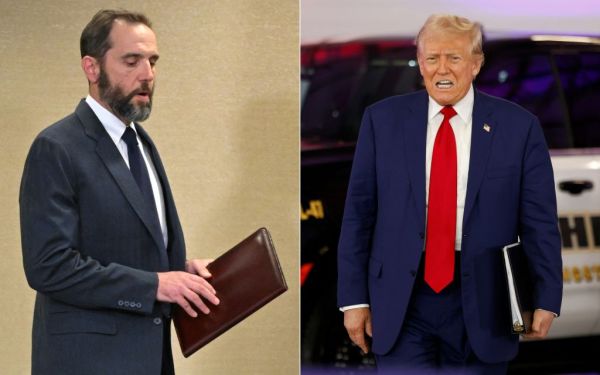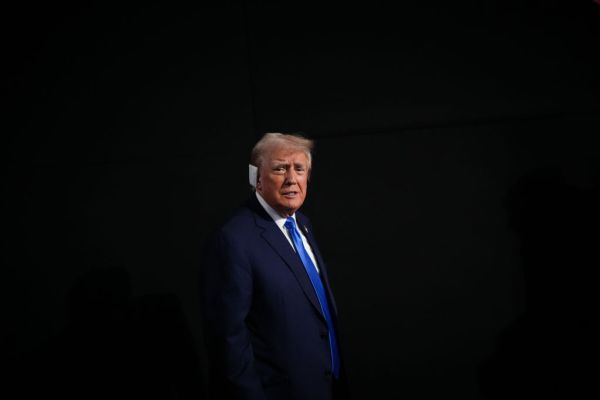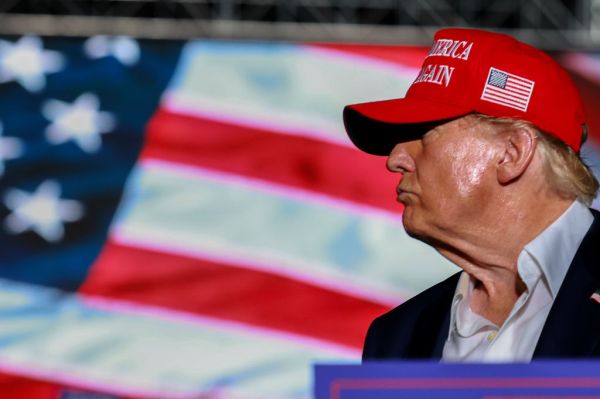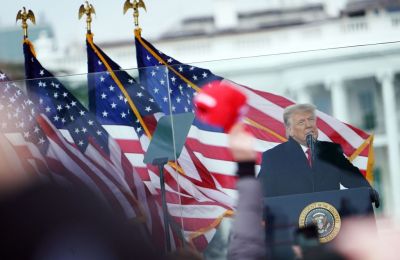Welcome once more to The Collision! The unsealing of a new filing in the federal criminal case against Donald Trump’s effort to overturn the 2020 election landed on Wednesday afternoon. We’ll get into why the special counsel filed this, revisit what the Supreme Court said (and didn’t say) on presidential immunity, and look at some of the brief’s juiciest nuggets. Let’s get right to it.
This week, we got a look at the unsealed court filing from special counsel Jack Smith in the election interference case against Donald Trump. In the 165-page brief, Smith shares even more evidence of his case against the former president. But why are we even doing this now?
The special counsel had already refiled the indictment against Trump in this case in August, which included the same number of charges—four—referencing the same criminal statutes as before: defrauding the United States, obstructing an official proceeding, attempting to obstruct an official proceeding, and conspiracy against rights. The biggest change was that the superseding indictment took out any reference to Trump’s conversations with officials in his Department of Justice about whether to appoint a new acting attorney general who would support Trump’s election fraud claims.
The purpose of this now unsealed brief was to show why the new indictment could move forward to trial after the Supreme Court’s presidential immunity ruling in Trump v. United States. In July, the Supreme Court had held that a former president could be criminally prosecuted for any unofficial conduct and most official conduct if “the Government can show that applying a criminal prohibition to that act would pose no dangers of intrusion on the authority and functions of the Executive Branch.” But the burden is on Smith’s team to show that Trump is not immune under that test, that Trump was acting as a candidate and therefore a private citizen for most of the charged conduct, and that any official actions were not properly understood as part of the powers of the executive branch.
First, let’s pause and do what Smith’s brief does: revisit what happened. After Trump appeared to be losing the 2020 election, he and a number of his lawyers, campaign staffers, and media allies began searching for ways to discredit the outcome in key battleground states and demonstrate that Trump had, in fact, won. This led to a push to present slates of alternative Trump electors in states Joe Biden had won who would suggest a disputed outcome that might give the Republican president’s team enough time to successfully delay the count, win some legal victories, and ultimately have Trump declared the winner of the election. Following weeks of defeats in the courts, the lack of any verifiable evidence of outcome-altering fraud or cheating, and the persistent refusal of Vice President Mike Pence to go beyond his ministerial role as president of the Senate during the counting of electoral votes, that focus shifted to disrupting the January 6 proceedings. We all know the rest.
Smith’s new brief adds details to this familiar story with the goal of emphasizing the ways in which Trump was acting as a private citizen and a candidate for office and not in his official capacity as president and head of the executive branch. As Smith explains, “although the defendant was the incumbent President during the charged conspiracies, his scheme was fundamentally a private one … the defendant acted as a candidate when he pursued multiple criminal means to disrupt, through fraud and deceit, the government function by which votes are collected and counted—a function in which the defendant, as President, had no official role.”
The brief argues that the history and text of the Constitution has no role for the executive branch in picking the next president—which invalidates Trump’s efforts to persuade Pence to delay the certification process, for example. Therefore, prosecuting Trump wouldn’t intrude on the powers of future presidents. As Smith puts it:
He sought to encroach on powers specifically assigned by the Constitution to other branches, to advance his own self-interest and perpetuate himself in power, contrary to the will of the people. As such, applying a criminal prohibition to the defendant’s conduct would not pose any danger of intrusion on the authority and functions of the Executive Branch; rather, it would advance the Constitution’s structural design to prevent one Branch from usurping or impairing the performance of the constitutional responsibilities of another Branch.
Trump’s actions in other instances demonstrate his awareness that he was acting in an unofficial capacity, Smith argues. This is where some of the newly unveiled bits of evidence come to bear. For instance, Smith explains how on January 4, 2021, a person identified as “co-conspirator 2” and who appears to be Trump’s private attorney, John Eastman, met with Trump and Pence in the Oval Office as part of the pressure campaign on the vice president to delay the electoral vote count. Smith notes that the then-White House counsel, unidentified in the brief but known to be Pat Cipollone, was invited to this meeting but did not attend it—something Cipollone himself testified to before the House’s January 6 select committee, though he claimed the reason for his not attending was privileged.
According to the account Cipollone gave to Smith, Trump told Cipollone when he arrived at the Oval Office that he did not want him in the meeting. “It is hard to imagine stronger evidence that conduct is private than when the President excludes his White House Counsel and only wishes to have his private counsel present,” reads the brief.
The special counsel promises plenty of evidence and arguments like this that all support this critical point: Trump was not acting in his constitutional role as chief executive. Trump had no official role, Smith argues, in how individual states selected their Electoral College electors, nor could Trump claim an official role in Congress’ count of the electoral votes. And all of this is built on a mountain of evidence that Trump was made aware, early and often, that claims of widespread fraud were false, that there were no more legal options for recourse, and that the vice president had no constitutional authority to intervene.
There are plenty of other moments in the brief that might not go to the heart of the question of Trump’s criminality but nonetheless paint a damning picture of Trump and his behavior.
For starters, there are people around Trump—campaign advisers, White House aides, and lawyer after lawyer—who express in private communications to each other as well as directly to Trump that the claims on which he was basing his challenges to the election results were false. On December 3, 2020, when a co-conspirator (who is almost certainly Rudy Giuliani) is presenting to a hearing of Georgia state legislators claims that 10,000 votes in that state came from dead people, White House chief of staff Mark Meadows privately texted with White House aide Eric Herschmann about how they both knew that a campaign attorney for Trump had already discredited that theory.
The brief also mentions “forensic evidence” from Trump’s phone that bolsters eyewitness testimony that Trump spent much of the afternoon of January 6 scrolling through Twitter while he watched the riot unfold on television—and that his now infamous (and now deleted) tweet sent at 2:24 p.m. that “Mike Pence didn't have the courage to do what should have been done” to delay the electoral count was sent when Trump was well aware what was happening on Capitol Hill.
And, in an exchange that Smith says his team does not plan to use in trial, a White House aide told the president on January 6 that Pence had been taken to a secure location in the Capitol as rioters broke into the building. According to this person, who told Smith he hoped the news would prompt Trump to do something to ensure Pence’s safety, the president instead responded “So what?”
One More Thing
Trump and his allies have criticized the timing of the filing's release by Judge Tanya Chutkan. They argue that the filing contained no new information, and that it was unnecessary to release it so close to the presidential election since the case has no chance of going to trial before then.
“For 60 days prior to an election, the Department of Injustice is supposed to do absolutely nothing that would taint or interfere with a case,” Trump posted in all capital letters to his Truth Social. “They disobeyed their own rule in favor of complete and total election interference.”
The department’s so-called 60-day rule is not a written policy but encourages federal prosecutors not to make public criminal investigations into a current campaign that could unfairly taint the public’s perception of a candidate so close to an election. As properly understood, the policy itself is very narrow, which is why FBI Director Jim Comey’s announcement that he was reopening the investigation into Hillary Clinton just days before the 2016 election was not a violation of it. But federal prosecutors, heeding this policy, did not take any public steps that would have revealed the ongoing investigation into whether Donald Trump’s campaign knowingly accepted help from the Russians in 2016.








Please note that we at The Dispatch hold ourselves, our work, and our commenters to a higher standard than other places on the internet. We welcome comments that foster genuine debate or discussion—including comments critical of us or our work—but responses that include ad hominem attacks on fellow Dispatch members or are intended to stoke fear and anger may be moderated.
With your membership, you only have the ability to comment on The Morning Dispatch articles. Consider upgrading to join the conversation everywhere.